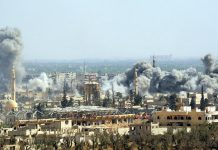OCTOBER 13, 2017: DAILY SUN
Human beings are the greatest creature on earth. They are also social animals and, therefore, cannot live alone. Human beings love each other, help each other and even can sacrifice their lives for others. Deep mutual love among parents and their children, family ties, love for each other, passion, emotion, compassion and rationality are not found among other animals as deeply as it is found among human beings.
However, if we look at the dark side of human behaviour, we would find that in this globalised world human beings, at the same time, are becoming as ferocious as wild animals. Sometimes they do not hesitate to kill their brothers, sisters, friends or neighbours. Many of them do not tolerate others’ success, try to dominate others at any cost, demonstrate own supremacy violating basic human rights keeping environment and habitat at the highest risk.
Jealousness, greed, extremism on the one hand and consumerism, capitalism, corporate colonialism on the other hand also bring a human being to a state of animosity. Humanity has also become highly mechanical in this ICT based electro-mechanical world.
Until the 19th century there was no existence of typical arms races as we have been witnessing since the beginning of the 20th century. Controlling over geographical location and establishing colony was the main target before the 19th century. But the scenario is significantly different in the present world. Now the superpowers always try to control over only the key strategic geographical locations such as strategic location of the land and ocean, markets of various consumer products and services through technological innovation, massive industrialisation and various trade mechanism.
The 20th century is described as the “bloodiest” one, with an estimated 187 million deaths due to various wars combined. Almost unbelievably, this number is nearly as high as the total number of deaths due to wars throughout all history. An increased world population, combined with huge armies and modern killing machines (explosives, machine guns, chemical weapons, etc.) have made us frighteningly efficient at killing one another. Taking the median estimates of death tolls for various conflicts throughout history, the best estimates put the total death toll due to all wars at 341.7 million.
According to new estimates released recently by the Stockholm International Peace Institute (SIPRI), $1.75tn was spent on the world’s military in the year 2016. This amount is the equivalent to Canada’s GDP or twice the GDP of the Netherlands. The SIPRI has another excellent data on military spending by nations where the US far outspends every other nation for its military, at over $611 billion, China coming second at over $216 billion, Russia is third with 69 billion, KSA is fourth with 63 billion and India is fifth with 55 billion. Recent arms deal of KSA for $350 billion with the USA has upgraded the position of KSA to 2nd for this year.
NATO members together spent a trillion dollars on the military and despite a significant 6% decrease, the US remains firmly in the lead, accounting for about 40% of the global amount. With a considerable percentage of citizens’ taxes both in America (where it is up to 47%) and across the globe going towards military expenses, surely people are entitled to question whether this money is well spent to ensure security. And how this spending is more justified than, say, investing in renewable energy, health care and education?
More than $3.5tn is spent as a whole annually on the world’s military and on subsidising fossil fuels. On the other hand, so many right things remain neglected. According to a recent survey, every day 19,000 children under the age of five die around the world, mainly from preventable causes. The costs of reducing mortality rates by two-thirds, improving maternal health as well as combating AIDS, malaria and other major diseases, are estimated to be $60bn (£39bn) a year. Meanwhile, $60bn is approximately the cost of buying and operating two nuclear ballistic missile submarines. The estimated total cost of achieving the six of the UN’s Millennium Development Goals related to poverty, education and health – eradicating hunger, universal primary education, child mortality reduction, disease prevention– is $120bn annually and this is very tiny fraction of total military spending.
These endless arms races are really illusive because human beings are running after uncertainty, speculation, fear, egotism and mutual disrespect. All of those vices inspire some dictators, army generals, politicians to make a huge preparation of many indecisive wars as we have been witnessing throughout human history. This type of attitude is completely against humanity. The main responsible of these arms races are the greedy arms traders, ambitious dictators and army generals. The greedy arms traders encourage many rich countries to create conflicts among nations and try to keep it persisting applying divide and rule policy. Even a single dictator or general could lead to a huge arms race and a bloody war.
But as a matter of fact, this is also not a reality that there will be no arms in this world. There must be some arms which will be only against any type of crime and unruly activities which will be applied to protect humanity, rule of law, peace and justice. But those armaments should be at a tolerable level; otherwise we can not make a society full of peace, prosperity and justice. The world has now become an ammunition depot. Nuclear arms races have brought this world on the verge of ultimate ruin. If the control of those bombs goes to the hand of mindless autocrats, the devastation might be unimaginable.
In many developing countries, a focus on military spending often means foregoing other important spending priorities. There are also many nations that have a huge standing military but an unreliable public infrastructure from hospitals to roads to schools. North Korea is an extreme example where we see an aggressive dictator’s relentless pursuit of gaining military might creating a huge tension and discomfort among neighbouring countries. This attitude may have been derived from frustration or a protest against neo-imperialists. However, as a result of that the standard of living of ordinary people is deteriorating day by day in North Korea.
So, the logical minds as well as the conscience of humanity must argue about the necessity of standing military and what size that standing military should be. That is as much a political question as an economic one. The real issue is what is an “adequate” amount of military spending, given that every extra dollar spent above the necessary level is a clear loss for the economy as a whole. In a democracy, that issue is debated by publicly elected officials and changed year to year.
Another argument for the negative economic impact of military spending is that there is a diversion of talent and technical skills towards supporting military research and development though military, to some extent, has benefited the private economy through the creation of microwaves, the Internet, GPS, drones etc.
Whatever the reality is, suppressing the basic human demand, infrastructure, food and healthcare by arms races for some unspecified enemies and indecisive wars is one kind of illusive war against humanity. In order to make a peaceful, prosperous world all of us should stand against reckless dictators, capitalists, greedy arms traders and corporate colonialists; otherwise this planet which has already become a time bomb, one day, might inevitably become the most dangerous place of this solar system for all living creatures.
© Copyright: Reserved by the writer (Noore Alam Siddiqui)



































